#anakin and shmi
Text

Anakin and Shmi’s goodbye
A little piece I did as a present for my sister but now she’s seen them I’ll be sharing the rest of what I did gradually :) this one was quite fun bc I painted the background with acrylic and then added the characters digitally
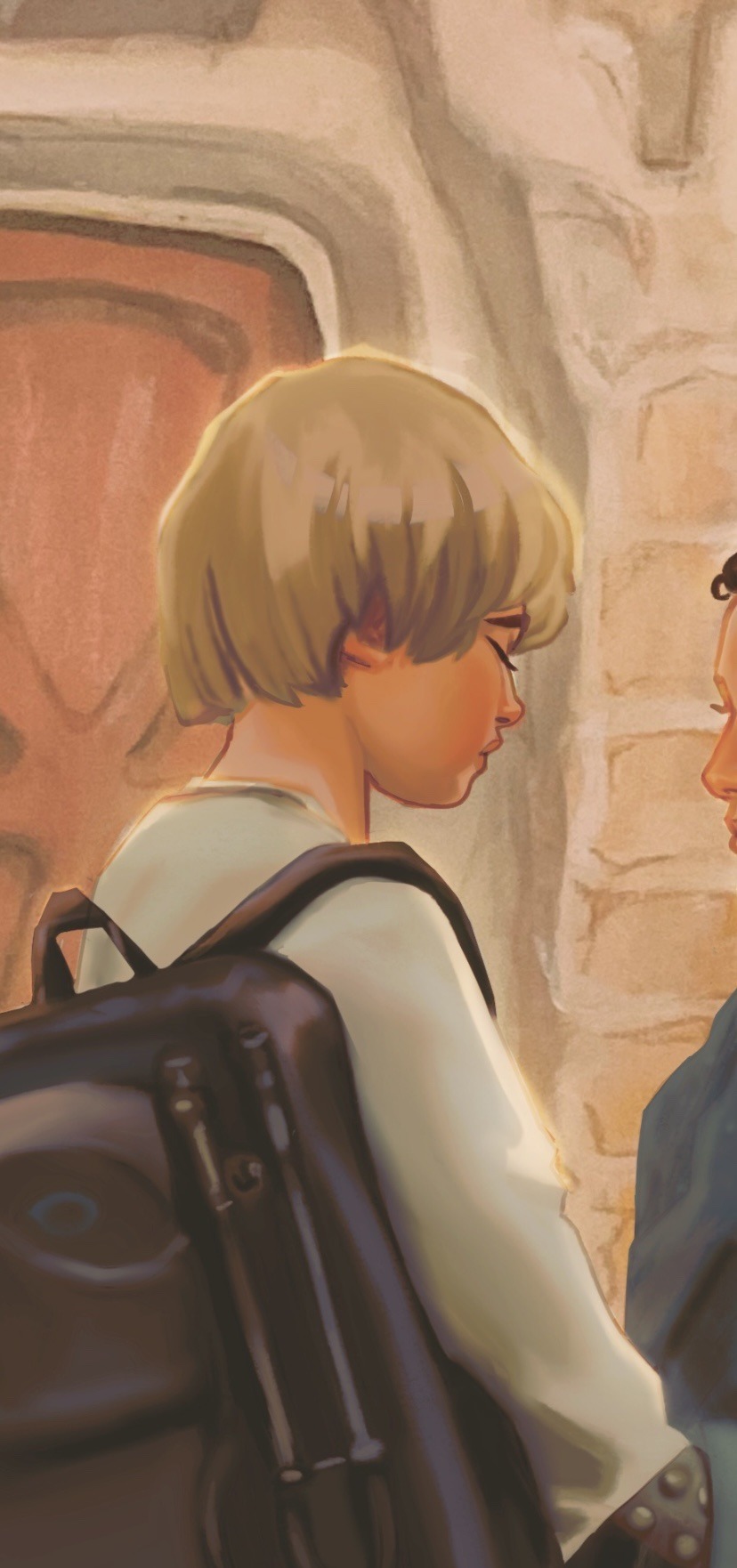

#art#artists on tumblr#fanart#star wars#star wars fanart#digital art#anakin skywalker#star wars prequels#character art#illustration#shmi skywalker#anakin and shmi#phantom menace#tatooine
2K notes
·
View notes
Text

Oh :(((
#this is from the tpm novelization#personal#star wars#anakin skywalker#shmi skywalker#c3po#c3po star wars#sw prequels#star wars novel#the phantom menace#tpm#anakin and shmi#star wars anakin#darth vader#fandom: star wars#type: meta
594 notes
·
View notes
Text
no, qui-gon did not kidnap anakin away from shmi, and he did not use shmi's position as a slave in order to coerce her to give anakin up. he made no attempts to request that shmi allow anakin to be trained at all, actually. he observed that anakin was force-sensitive, but that was it. there were no requests for her to send anakin to the jedi, or even suggestions that the jedi might be a better place for anakin. just a simple, neutral observation that anakin is likely force sensitive. after that, qui-gon allowed shmi to provide her own opinions about anakin's future.
it's shmi who volunteers the story of anakin's immaculate conception and says that she "can't explain what happened." she follows this comment by asking qui-gon, "can you help him?" which links qui-gon's assistance to anakin's status as a force-sensitive child. she is specifically asking for his help with regards to anakin being force sensitive, because he knows more about it than she does.
and later, once qui-gon informs her and anakin that he's managed to buy anakin's freedom, he makes no attempt to dictate or even suggest what shmi should decide with regards to her child's future. it's shmi who asks qui-gon "will you take him with you?" and it's shmi who asks qui-gon if anakin can "become a jedi."
shmi doesn't ask if qui-gon can find another home for anakin outside of the jedi; she specifically asks if he can be brought to the jedi temple. and it's because of that first conversation with qui-gon: it's because she acknowledges that anakin has unique needs that only the jedi can provide for. it's also because, as she later comments to anakin, she knows that being a jedi is "making your dreams come true." because she knows it's what anakin wants as well.
there's also hints that shmi is force-sensitive and is listening to the will of the force when making this decision; she makes comments about how qui-gon was "meant to help" anakin, about how her place is on tattooine, and about how anakin will "know what's right" by listening to his "feelings." all of these statements involve shmi being attuned to the will of the force and recognizing its influence over the events that unfold around her. there's an entire other essay to be written about how in her short amount of screentime shmi behaves entirely like a jedi, proving her love but not attachment to anakin twice over, but i haven't the space for it here.
lastly, it's shmi who first brings up the idea of anakin leaving her behind. she's the one who tells him to "let go" of her, and who tells him "don't look back." even once she is freed- which is implied to have been within 4 years of anakin leaving- she makes no attempt to contact him on coruscant, nor to travel to coruscant. she states in tpm that tattooine is where she's meant to be, and so there she remains even once she has the ability to choose otherwise.
tldr: shmi is the one who brought up jedi training, not qui-gon. she wanted anakin to learn from experts in the force, she knew anakin wanted it, and she is implied to understand that the force wanted it. she is a human being with agency, and she chose to let anakin be taken to the jedi in particular. and in all the years between when she was freed and when she died, she respected the space required by the jedi lifestyle and did not attempt to broach it.
#movies#the phantom menace#tpm#shmi skywalker#shmi#anakin skywalker#anakin#qui gon jinn#qui gon#qui-gon jinn#qui-gon#qui-gon and shmi#anakin and shmi#star wars#sw
902 notes
·
View notes
Text
Empress
This AU really starts when Anakin finds his mother in the Tusken camp, but only truly works if there is a little set up before. It is imperative, for reasons that will become clear, to note that in this Palpatine has been manipulating Anakin with the Force, as opposed to only psychologically, since he was a child. Palpatine has been seeding the darkside, hidden deep so that it was never discovered (even by Anakin), waiting to sprout and spread the darkside like an infection at the appropriate moments.
When Anakin finds his mother as she dies, he loses it, but not to violence. Instead he panics and shoves every bit of Force that he can into his mother’s body to try and bring her back and heal her. Every bit of the Force, including the darkside seeds that Palpatine had been planting. Because healing is primarily a light sided technique, thus somewhat purifying, Shmi does not get the full force of the darkside infection that would have hit her son (so we avoid Vader!Shmi or even Full Sidious!Shmi) however there were a number of long lasting effects to the way Anakin panicked and brought her back (incidentally Anakin has now created two new deities for the Tuskans, which Shmi does note and will make use of later). These include:
A Force bond between her and Anakin that gave her Anakin's memories and feelings for the past decade.
A working knowledge of what Palpatine knew (From Palpatine’s Dark Seeds), though no firsthand memories.
Force Sensitivity that is powerful enough to use the various techniques she just gained the knowledge to use.
A significant hit to the moral centers of her psyche.
A Soul Deep and engrossing ambition to rule the Galaxy.
Now Shmi is not evil in the way that Palpatine is (Palpatine is the kind of evil that not only does whatever he wants to accomplish his goal, but actively goes out of his way to create as much collateral as possible and will in fact even mildly inconvenience himself in order to increase collateral damage) but she does now fall closer to Amoral than not. Like her first option is not to kill kids, but it is never not an option. Shmi does justify her new desire to rule the galaxy, based on the fact that she would be better at it than Palpatine.
By the time Anakin and Shmi have made it back to the Lars homestead, she has her son wrapped around her finger even more than she would have. She had also, through the careful recounting of how one of the men who had seemed so kindly to the slave children had actually been a child murder (couching it it in terms that one of Anakin's childhood friends, who it turned out had been a victim of this man, grave had been found and the man brought to a rather brutal justice), partially broken Anakin’s trust in Palpatine without ever letting on that she knew who Palpatine was.
After they get back to the Homestead, Shmi tells Anakin that she wants him to visit again and to bring Obi Wan (It was after they had talked about what had been happening since he left). Anakin loves Obi Wan as a brother, and as such Shmi loves him too. Padme has also fallen quickly under Shmi’s influence, which is good considering that Shmi intended to make Padme another daughter in law (Both because Anakin had a crush, and she wanted Anakin to have what he wanted, and because Senator and former Queen of Naboo is actually a decently powerful set of titles). Shmi gently shoos her sweet, oblivious son off the planet with her future daughter in law (it is for the best that her Jedi Son be off the planet for what she is about to do next) making them promise to visit soon.
Cliegg and Beru also fall quickly under Shmi’s spell. Owen holds out a bit longer (I am fully convinced that his ability to hold back Skywalker BS comes from growing up with Shmi, not his few interactions with Anakin) but is just as willing to follow Shmi’s lead within a tenday.
While a galaxy wide war is breaking out, Shmi quietly but very firmly takes control of Tatooine. Then, in spite of the fact she had not left the planet in decades, she quickly takes control of the rest of the Hutt Empire. Her identity remains hidden; she does not want to fight her son or his Jedi family because they do not yet understand her vision for the galaxy. They will, of that she is sure, but it will take time.
One of the many things she does is abolish slavery within her new Empire. It is both easier and harder than it would appear. Easier in that she does not care about the power or money of the people who made their living in trafficking of sentient life, so she does not care about the economics of the systems she dismantles. Harder because the Hutt Empire was built on slavery; there are significantly larger portions of every population of the Hutt Planets then anyone realized who had spent most of their lives enslaved, with no training or education and very little idea how to exist without being enslaved (with all the psychological and sociological implications therein). But she does it, quietly absorbing the fledgling Zygerrian Empire as well.
A year and a half into the Clone wars Shmi is finally ready to make her move.
In that time she has become well connected with Padme, who asks for approval to marry Anakin six months into the war (Approval that Shmi grants, on the condition that Padme also get approval from Obi wan, as Anakin’s older brother/father. Padme asks, and to the surprise of both Padme and Anakin immediately gets Obi Wan’s baffled, but pleased, approval. In this one marriage is not forbidden to Jedi, it really isn’t even discouraged. No one seems to want to marry a Jedi, as far as the Jedi are concerned. Date a Jedi, well that seems to be common fantasy. Sleep with a Jedi, all the time. But never marry. This all serves Shimi’s true purpose, to continue to break the trust between her son and Palpatine). They do decide to wait until after the war, when they can have everyone attend; in part because Palpatine is pushing them both in a really creepy way.
She makes her move by going on vacation with Cliegg to a world she knew, from her own spies, was about to be attacked by separatists. A world that it was highly likely the 212th would be deployed to. In the time it takes for the 212th to liberate the planet, it is a relatively minor battle so only takes a few weeks, Shmi and Clieg have connected with the battalion and convinced them to transport them (Shmi and Cliegg) to Coruscant. If asked, even Obi Wan, Cody, or the Natborn officers are not sure how they came to agree to take two civilians to the Core but everyone Shmi meets becomes absolutely convinced that it was a reasonable decision. During this trip Shmi bonds with Obi Wan, as her son’s brother/father/teacher. This was one of her goals, to get a clearer picture of who Obi Wan is, and through him the Jedi Order; Anakin’s memories and feelings are a bit mixed on the Jedi as a whole but she also knows, from Palpatine’s knowledge, that Palpatine had been manipulating those feelings for years. She finds that she does like Obi Wan. Because of this Shmi intends, beyond even what her plan calls for, that she would ensure that Obi Wan found happiness in her Empire.
Upon arriving on Coruscant Shmi sends Cliegg (in disguise) to meet with various criminal underworld leaders who know of her fledgeling Empire, while she meets with members of the Jedi council to plant the seeds of her Galactic Empire.
It is in this that we truly see the difference between Shmi and Sidious. Shmi wants to Rule the galaxy. Sidious wants to Subjugate the galaxy. Now granted the difference between the two is not as much as people who want the former would protest, but is greater than what the people who want the latter would claim. In this case ruling is a small group having a disproportionate amount of power over a larger group. Subjugation is a group or person asserting total control over another group or person. While a ruler can abuse the power they have, in order to subjugate someone, a being MUST abuse them to break them in such a way the subjugator can control them.
In spite of her forced amorality Shmi is actually a good person and wants to be a good Empress for the galaxy. So for her, subjugation is more work (realistically 90% of the galaxy is not going to notice if they are in a republic or an empire, and not just because the Empire had been disguising itself as a republic for a decade. That same 90% have comparatively simple needs and are going to be fine with a ruler who provides them. Whereas requires constant control measures to apply the exact correct amount of pressure to bend the populace to your will, without breaking them into rebelling. Ruling well is actually less costly) for less benefit. Because of that having the super powered warrior monks, who most of the beings that would oppose an Empress on principle are going to look to as a paragon of wisdom, buy into the idea that Shmi should be Empress and that they would be happier in her Empire makes more sense than eradicating them. Also, complicated feelings aside, the Jedi make up part of Anakin’s family and she does not want to hurt Anakin’s family.
Shmi also, at the behest of Anakin, took time to go with him to meet his friend Palpatine. While in the waiting room she speaks with Fox, on guard duty, who she recognizes from her talks with Cody as the person to place a bet with(No one suspects the stern commander of the Coruscant Guard to be the biggest bookie in three systems). After about an hour of chit chat (During which Palpatine has no idea he has met someone with all of his knowledge, who is planning to abscond with the Grand Sith Plan) Anakin and Shmi leave the Senate. Anakin semi anxiously asks her what she thinks of Palpatine, babbling a little bit that Obi Wan doesn't like him, but Obi Wan hates most politicians. Shmi, after letting a long pause stretch, says that Obi Wan has good instincts (Look I really want Palpatine to be faced with his own manipulation tactics) and casually mentions Obi Wan’s time enslaved and how that must have hond those instincts- which he had not told Shmi about but that she could guess. Again without directly accusing Palpatine of anything, Shmi manages to get across to Anakin that as the Chancellor, Palpatine actually currently has all the power and has used it to effectively enslave the clones and the Jedi. Fully breaking Anakin’s trust in Palpatine and tying him closer to the Jedi (where Shmi wants him). During this exchange Anakin asks what she had been talking to Fox about and she answers with ‘placing a bet’. Anakin lights up and guesses it is the ‘CodyWan Bet’, because literally everybody noticed their pining and that neither will admit it (Shmi uses that to drive the point home that both are effectively enslaved and do not feel free to be together if they might be ‘sold’ apart-a concept that Anakin is very familiar with).
I am not sure where it ends, except that Shmi does indeed become Empress and her Force powers work as such that she gains power through being loved, so in being a good ruler she stops aging. The Jedi do buy in and Palpatine does end up dead. Someone in Shmi’s smaller Empire, before she becomes Empress, discovers the chips and their purpose, which leads to the entirety of the Clones transplanting themselves (GAR, Cadets, everyone) to a planet in the former Hutt space (deeply freaked out over what they could have been made to do to their Jedi) and refusing all calls for like a year, while they dechip. The Jedi (all of them) transplanted themselves to the next planet over, waiting semi impatiently to be allowed to visit their men again. Shmi meeting Ahsoka after she becomes Anakin’s Padawan and deciding that, as her oldest grandchild, Ahsoka would have the option to be her heir if she would like (Ahsoka really wants to be a Jedi, but agrees to hold the status until another heir comes along-she gratefully passed the heir status to Leia when Leia was born, as she could not be knighted while still the Empress’s Heir).
Oh and Obi Wan does get to be happy with Cody in the new Empire, with frequent visits from Satine (I like the idea that they were childhood sweethearts/first loves that knew they would not fit well romantically but still loved each other and got to be overprotective of each other-Satine adores Cody, thinks he is perfect for Obi Wan and thy find time every so often to take an evening to drink over whatever ridiculous situation Obi Wan go himself into this time)
#star wars#star wars the clone wars#obi wan kenobi#star wars au#anakin skywalker#codywan#sheev palpatine#anidala#shmi skywalker#anakin and shmi#sw
222 notes
·
View notes
Text
This is just me stating a headcanon, and it's not a particularly hot take... but Shmi Skywalker would've been a great Jedi.
She loves selflessly, accepts the natural course of life and lets go when the time comes. Just look at how her words align with what Lucas describes as Jedi principles.

"No human can let go. It’s very hard. Ultimately, we do let go because it’s inevitable; you do die [and] lose your loved ones. But while you’re alive, you can’t be obsessed with holding on."
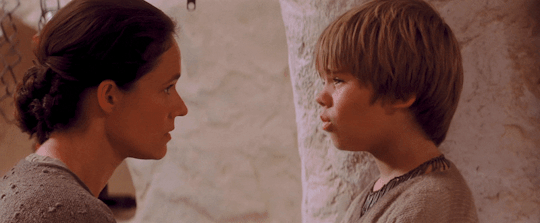
"You can love things but you can’t be attached to them. You must be willing to let the flow of life and the flow of the Force move through your life, move through you. So that you can be compassionate and loving and caring, but not be possessive and grabbing and holding on to things and trying to keep things the way they are. Letting go is the central theme of the film."
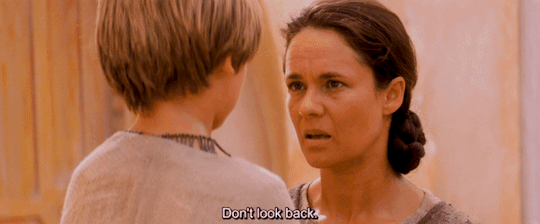
"[A Jedi] can love people, but [they] have to love them unconditionally, in terms that you can’t hold on to them."
Her compassion perfectly contrasts the various forms of greed shown throughout the Prequel trilogy.
Shmi sets the standard for what Anakin and the Republic's leaders should be like, perfectly embodying the message of Star Wars.
#Shmi Skywalker#anakin and shmi#jedi order#star wars#lucas quotes#a SHORT post (for once)#The Phantom Menace#TPM#Anakin Skywalker
244 notes
·
View notes
Text
Palpatine: does sith magic
Fifteen different universes worth of anakin, obi wan, Luke,Leia, padme, shmi, ahsoka, rex, din, grogu, cody, fives, echo, chewie, and han pop into the same coruscant at the same time
Coruscant: is destroyed in the best and most chaotic ways possible
#star wars#stars wars#the clone wars#clone troopers#anakin skywalker#coruscant#padme amidala#anakin and padme#star wars padme#shmi skywalker#anakin and shmi#obi wan kenobi#luke skywalker#leia#chewbacca#anakin#leia organa#ahsoka tano#star wars ahsoka#sw ahsoka#captain rex#the clones#501st#clone wars#tcw#din djarin#din grogu#grogu#commander cody#arc trooper fives
71 notes
·
View notes
Text
I feel like this is a super wonderful time to point out that Qui Gon literally won Anakin as property in a pod race bet. Anakin, for all intents and purposes, literally belongs to the Jedi Order. When he is “freed” it is becuase Qui Gon chooses to do so; not because Anakin is a child who deserves to live his life, but becuase he was useful to the order as the Chosen One. Qui Fon said himself that they did not come to Tatooine to free slaves, and that he can not help them. Only when Anakin is revealed to be powerful do they decide to try to take him, and even then it’s through winning him in a game. Seriously messed up. And that’s got to weigh on Anakin all his life, that he was only worth something when his power could be of use to others.
Ask yourselves, If Anakin hadn’t been allowed to train by the council, what would have happened to him? And given the circumstances at which he arrived at the order, can Anakin really be considered to have joined as his own free will? Can he ever consider the Jedi as family? Can he ever consider them more than the people whom he “owes” everything for “saving” him from his life which he “should be so grateful for”? I don’t think so, and I guarantee you that Anakin had these same doubts but felt to ashamed of his own self doubt enforced by those around him to voice his concerns. He is shamed and criticized for missing his mother whom he was forced to leave in slavery, and lectured for feeling the slightest of negative emotional responses.
When people say Anakin joined the Jedi of his own free will and could leave whenever he wanted I honestly have to wonder if they’ve experienced the same cannon as me, becuase to me a 9 year old enslaved child can not make the free will choice to join a faction that will send him back to be a slave as soon as he doesn’t meet their expectations. To me a young man who feels like he owes them his life cannot “just leave” when his whole identity is pensioned on his usefulness to others.
This is exactly how cults operate and honestly Anakin’s transition into The Jedi Order is cast in a dark light when you realize he stood to lose everything either way, he lost his mother is he was a Jedi and he lost his freedom if he wasn’t. It was a lose lose situation that no reasonable person would consider a real choice for a child to make. In some cannon materials Anakin even asks himself if his life as a slave would have been better for him than his life as a Jedi. Just let that sink in.
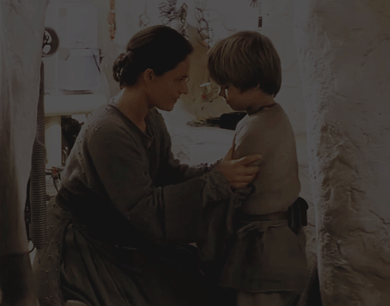

And before any one jumps on here with “BuT sHmi WaNteD HIm to Go” I would like to argue “what the hell was she supposed to say in that situation????”. Was she supposed to have said “nah, I think I’d rather keep my son in slavery forever rather than give him at least a CHANCE to be free to live a life on his own. I think I’d rather risk him DYING in the sun or by torture than I would allow his dream of becoming a space wizard come true.” I mean to argue that she has full autonomy in this situation us LUDICROUS. Qui Gon doesn’t even ASK her to test Anakin’s blood because he doesn’t even owe her that dignity since she has no legal existence. It’s gross. Let’s not use her desire to give her son a chance at something other than hellish slavery as a free choice to allow her son to be taken away.
#anakin skywalker#star wars#anakin star wars#anakin#anakin needs therapy#darth vader#grooming#jedi grooming#meta#the phantom menace#anakin and shmi#shmi skywalker#anakin needs a hug
163 notes
·
View notes
Text
You: Shmi didn’t ever get to leave Tatooine like she totally always wanted to because the Lars were forcing her to stay, or it was too hard to leave, or because neither Padme nor Qui-gon helped her
Me, a feminist intellectual: those are valid interpretations but lets consider the idea of Shmi staying on Tatooine of her own free will because she saw something worth saving. This would make her much more relevant thematically because it would place her in direct ideological opposition to Anakin, who hates Tatooine and can't stand to even be on the planet (because it reminds of his self-esteem issues due to slavery) let alone do anything to improve it. It would also hammer home the fundamental idea of SW about that fact that we can choose how we respond to bad situations by giving us Shmi, a character who experienced slavery for three times as long as Anakin and yet when she found her freedom chose to help other people instead of being bound by the pain of it all her life.
Silly format aside, what if we treated Shmi as a real character who is allowed to have different opinions about Tatooine than Anakin?

33 notes
·
View notes
Text
Pro-Jedi Essay On the Life and Fate of Shmi Skywalker (long post)
Many who believe that the Jedi Order had lost their way, are pointing at the life and death of Shmi Skywalker. However, their arguments are based on unexamined assumptions regarding the role and ways how the Jedi Order operates, the political and legal reality of the Galactic Republic, or founded on morals different from those depicted and advocated by George Lucas.
This is a long essay, possibly the longest I ever wrote, since each and any discussion regarding Shmi Skywalker and the Jedi Order, is the interplay of five distinct topics, con-joined and informing each other. These are:
The Paradigms of Love: Hierarchical vs. Horizontal
The Fall of the Galactic Republic: Fallen Symbiosis
Horizontal love, Anakin Skywalker and the Jedi Way
The Dark Side of "they could've free at least Shmi!
The Life and Fate of Shmi Skywalker - the Problem with "Deserving"
The Paradigms of Love: Hierarchical vs. Horizontal
One of the core lessons throughout George Lucas Star Wars, is that we need to clear ourselves from the attitude of discrimination toward others, based on feelings of distance and closeness, and that love manifests in two ways, along the same lines. On the one hand, there is love for those who’re immediately around you – your spouse, your parents, your children, your friends, and you do everything you can to protect the people that you love, against all those others outside that very tightly drawn circle. It’s driven by attachment: whether a person is within or without that circle, is determined by whether or not you find them enjoyable, agreeable, pleasant and satisfying, or whether or not they share your beliefs and opinions. We have the idea, deeply embedded into our minds, that the willingness to put people within that circle, our “personal relationships” first, and all the others who we have a bad, or no relationship whatsoever, second, is the measure of love, loyalty, commitment, affection and care.

On the other hand, there is unconditional love, that is compassion: wanting another person to be happy and free from suffering. By definition, compassion means to feel with, to suffer with and to experience with another - it's the sense of profound oneness, innate connectedness, a sense of being parts of each other, when we feel another person's suffering or happiness as our own. Just like when we hurt our finger, we don't think, "Oh, my finger is hurt, maybe I should help it", but rather, there is an instant and intuitive, natural response to it, our quest to be happy and not to suffer is inseparable from and complemented by the same quest of our loved ones. Unlike attachment, compassion can extend beyond the individuals who we're close with or make us feel good; based on the realization that all living things want to be happy and doesn't want to suffer, just as intensely as we and our loved ones are, it can encompass all living beings wanting to be happy and free from suffering - in fact, not even one living thing can be excluded from the circle of compassion. And therefore, if compassion is genuine, it's no longer possible to make hierarchy between the well-being of the people who're close to us and of those with whom we have adverse or no relationship at all.
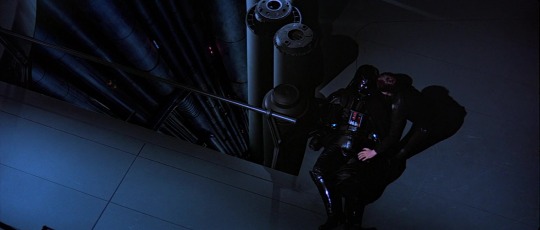
It's essential to understand that genuine compassion is to abandon such hierarchical thinking, not the reversal of the hierarchy, that is to discriminate toward the people we have close, compassionate, loving and trusting and personal relationships for the sake of the people we have adverse or no relationship at all. Nor does genuine compassion allow for lowering the love, care and commitment we have for those close to us, or to forego such relationships, that is trying to avoid discriminating based on feelings of distance and closeness, by not getting close to anyone. In many ways, that's more unwholesome. Genuine compassion is horizontal: the realization that all living things want to be happy and doesn't want to suffer, just as intensely as we and our loved ones are, allows compassion, the wish for others to be happy and not to suffer, to spread effortlessly, evenly, inexhaustibly. Indifference is to say, "I care no more for my mother than I care for a stranger", compassion is to say, "I care for this stranger no less than I care for my mother." In Buddhism, indifference is the "near enemy" of non-attachment: it's mimicking it, but it pushes us into suffering.
The Fall of the Galactic Republic: Fallen Symbiosis
The Balance of the Force
George Lucas' Star Wars story is essentially about the loss and restoration of the balance of the Force. Although there are many interpretations on this concept, Lucas himself was very clear on that balance of the Force means keeping our selfishness under the check of our selflessness and avoid falling to the dark side, which is greed and self-centeredness, and being compassionate instead, which is loving each other unconditionally and caring for each other. It's dual: when you find balance, you're a compassionate individual, you control your selfish side, and you can do a lot of good things; and when you have a group made up of compassionate individuals who control their greed, you can have a symbiotic circle, which is the balance of the two sides of the Force at large, of the galaxy itself, that is selfishness being under the control of selflessness, and people come together to be as one, cooperating.
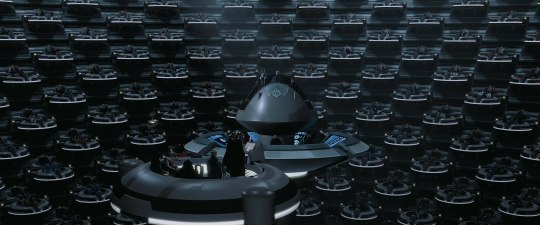
The central conflict of George Lucas’ Star Wars story is the loss of balance and the fall of a symbiotic relationship. The Galactic Republic is the galaxy forming a symbiosis, following the horizontal paradigm, existing in balance; the loss of balance is the shift from the horizontal love paradigm to the hierarchical one. "The Republic is not what it once was. The senate is full of greedy, squabbling delegates. There is no interest in the common good" and it "no longer functions" as it was said it Episode I, and as Lucas tells us, it's because "the Senators have fallen out of the symbiotic circle” and “they couldn’t agree on anything because their interests became so divergent, so they couldn’t get anything done as a Republic.” It's crucial to understand that although it's very popular to declare that the problem was the Senate, therefore, the Jedi Order was supposed to stop serving it, the issue depicted in Lucas' Star Wars is far worse and roots deeper than that. As corrupt and dysfunctional the Senate become, it was made up of senators who were elected directly or indirectly by the people of the member worlds. And as Ahsoka teaches the youth of Mandalore in Clone Wars, "citizens must be vigilant so corruption can't take root" and "it's every citizen's duty to challenge their leaders, to keep them honest and hold them accountable if they're not. Lasting change can only come from within." The horizontal love paradigm was declining in the entire galaxy, with individuals no longer operating as a group, no longer running their democracies, slowly drifting towards the hierarchical paradigm, which eventually erupted in the Separatist movement and the Clone Wars, resulting in the galaxy's fall to the dark side: the Galactic Empire. As Lucas summarizes the fate of the Republic: "well, the people gave it away." One of the core reasons why the "Jedi lost their way" theory gained a foothold is because the people are very much troubled by this notion, since it reveals that they have all the responsibility for maintaining democracies.
Understanding the Hutts and Hutt Space

The existence of slavery at the Outer Rim is the result of the gradual decline of the Galactic Republic. Tatooine is an out of the way, small, poor, sparsely populated planet on the outer rim of the galaxy, the home of the Jawas, the Sand People, scavengers and moisture farmers, controlled by the Hutt families who are vile galactic gangsters. It's part of the galactic underworld, where the anti-slavery laws of Republic, that are, as Padmé says, outlawing slavery in the entire galaxy, are not respected. As Shmi states, "The Republic doesn't exist out here. We must survive on our own." On Tatooine, the Republic's currency has no value, as people want "something more real", like ships, pods or slaves or "wupiupi" which is most likely made of something that has value on its own. Being the den of a powerful crime lord, the planet's spaceports, where slavery thrives, are "havens for those that don't wish to be found" and a "wretched hive of scum and villainy" - it's no surprise that in the cities grown around them, holding others hostage for economic gains or pleasure, which is against the laws established by the Galactic Republic as well, is part of everyday life. Hutt-controlled Tatooine is not a "slave state" as opposed to the "free states" of the Galactic Republic, like in the pre-1865 USA, nor it's an entity that shares borders with the Republic. In truth, Hutt Space, and everything within its borders can be paralleled only to those areas of Sudan, Liberia, Sierra Leone, Uganda, Congo, Niger and Mauritania, where the government has no effective control, and slavery is still alive and well in 2023. Although Jabba and the others are usually addressed respectfully, they're universally regarded as "criminals" or "vile gangsters." When Palpatine says, they must reach an agreement with Jabba, Mace Windu replies: "I don't like this, dealing with that criminal scum. This is a dark day for the Republic."
The Jedi Order: Guardians of the Waining Light
The Jedi Order was well aware of that the Force is out of balance. As Lucas says, "[Dooku] carries the sympathies of most of the Jedi, which is that the senate is corrupt and it's incapable of carrying on any meaningful action, because they argue about everything all the time" however, restoring lost balance cannot be done through force, only through bringing compassion and sanity back to the Senate and the galaxy. Many who believe, the Jedi Order had lost its way, argue, the Jedi Knights failed as guardians of peace and justice, neglected their duties and turned their backs on the most vulnerable - however, such allegations are founded on the idea that they were supposed to be the ones in the universe who erase injustice, conflict, and wrongdoing. It's very important to remember that the Jedi Knights, as they state it repeatedly throughout the Saga, are "keepers of peace, not soldiers" and "not warriors." Even though the Jedi Knights were inarguably very good warriors, in Episode II, it was illustrated powerfully that they cannot win on the battlefield. "A lot of people say, 'What good is a lightsaber against a tank?' The Jedi weren’t meant to fight wars. That’s the big issue in the prequels" Lucas reminds us. "If they do have to use violence, they will, but they are diplomats at the highest level" and "they don't kill people. They don't fight," and they "weren't mean to fight wars." If they Jedi would've decide to wage a war on the Hutts, the war would've siphon off Jedi Knights, neglecting the rest of the galaxy and they’d have lost, most of them killed, making things even worse.
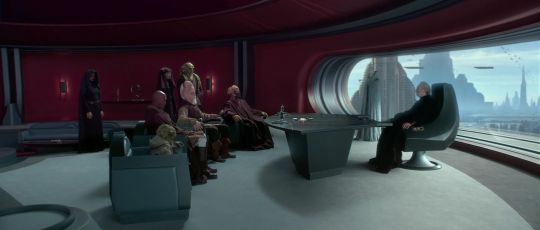
The essential difference between a Jedi Knight and a superhero is that superheroes are fundamentally god-like individuals who fight our battles for us: they topple dictators, stop corrupt politicians and greedy companies, they fend off armies, stop us from destroying ourselves. A Jedi Knight cannot and won't do that. As George Lucas says, "[the Jedi Knights] were never designed to be a superhero or anything like that. They were designed to be a Buddhist monk, who happened to be a very good warrior." Whenever they're do involved in battles, they do so in order to protect key figures who're able to unite their people against the forces of greed and destruction, like Padmé Amidala, both Queen and Senator, and Duchess Satine. They worked closely with the Chancellor of the Republic, especially with Palpatine, who promised to fight off corruption in the Senate and lead the galaxy toward a better future. They are “monk-warriors” who are “monks first, and they try to convince people to get along.” They’re “ultimate father figures” and “intergalactic therapists” and “warrior-monks who keep peace in the universe without resorting to violence.” They are heavily reliant on compassionate, democratic, thus strong galactic community, the ever-growing symbiotic circle, to guard peace and justice: the Jedi Order needed the Republic, and later, the Rebellion, to succeed. And they had reassurance that the lost balance will be restored: it was prophesied that the Chosen One will come and bring balance to the Force.
Horizontal Love, Anakin Skywalker and the Jedi Way
Widely popularized ideas are that the reason why Anakin is not going back to Tatooine to free Shmi, is because he was forbidden by the Jedi Council to do so; he expected something fundamentally different regarding the Jedi teachings, or their way of life, their limitations or the way how they operate - however, these ideas are not just lacking any rational basis in the actual story, but also wildly contradictory to Anakin's portrayal. In truth, all these assumptions are stemming from fans conflating their own expectations and perceptions regarding the Jedi Order with how Anakin and other characters are actually viewing them, and/or the desire to see the hierarchical love paradigm being affirmed by Star Wars.
"I had a dream I was a Jedi. I came back here and freed all the slaves"
In Episode I, Anakin Skywalker is a very compassionate, very selfless and very good kid, who gives without a thought of reward and know nothing of greed, who dreams of becoming a Jedi Knight, and he is very clearly thinking along the lines of the horizontal model of love. He tells Qui-Gon, "I had a dream I was a Jedi. I came back here and freed all the slaves. Have you come to free us?" which clearly shows that he considers himself as part of a team, encompassing all the slaves in Tatooine, and in his mind, a Jedi Knight is not only freeing his mother and friends, the people he's close with, but everyone. When he is about to leave with Qui-Gon to actually become a Jedi Knight, he vows, “I will come back and free you, mom” and we know that he plans to achieve this by making his dream come true.
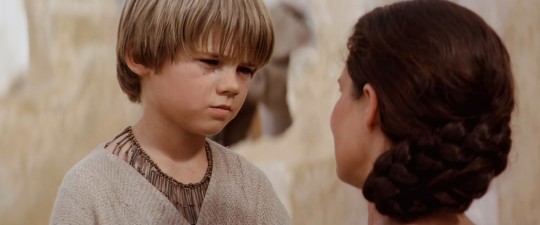
Anakin's situation is the same as Padmé's in Episode I: while Naboo is invaded and its people are tortured, Padmé does not establish a hierarchy between the well-being of her loved ones and the well-being of the rest of the Naboo, but decides to go with Qui-Gon to Coruscant to ask the help of the Senate, which was supposed to be the quickest, easiest and most effective way of freeing her planet. Anakin leaves with Qui-Gon for the Jedi Temple at the heart of the Republic, to become a Jedi Knight, to become the hero who will return and bring freedom to his mother and all of the slaves.
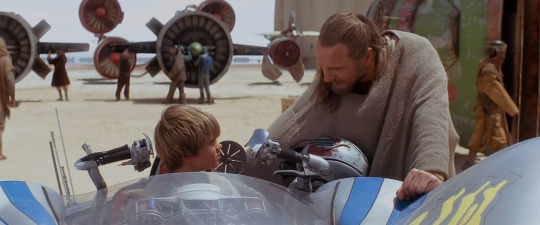
It's to be noted that even though a portion of the Star Wars fandom criticizes the Jedi Knights for not ending slavery on Tatooine or not trying to free at least Shmi, accusing them with indifference or failure to do their duty to guard peace of justice, Anakin Skywalker himself doesn't hold these opinions. He knows that a Jedi Knight brings peace and justice, and his expectations that as one of them, he will free his mother and all the slaves, is realistic: the anti-slavery laws of the Republic are outlawing slavery in the entire galaxy, and in the past, with a functioning Republic, the Jedi Order dismantled the slave empire of Zygerria, enforcing the laws, guarding peace and justice. It's very important to notice, that even though he believes, "no one can kill a Jedi", it never once occurs to him to cast stones on Qui-Gon or the Jedi Order for the conditions on Tatooine - he's offering his help so they can leave the planet and continue their journey to Coruscant as soon as possible. Never once suggests that they should go to battle against the slavers, or use violence against them, not even when he realizes that Shmi must stay on Tatooine. All this clearly shows, he understands and adheres to the Jedi way. Even more so, the only thing that Anakin is shown to be wrong about the Jedi Knights was his belief, "no one can kill a Jedi" - never once he gives any reason for us to believe that he expected something fundamentally different regarding the Jedi teachings, or their way of life, their limitations or the way how they operate. It should be noted that it's not the Jedi Order, but the Republic, what he becomes more and more frustrated with: in Episode II, he admits, "I don't think the system works," believing, if the people can't agree on what's the best for the most people, "Well, then they should be made to."
Anakin's Decision and the Circumstances on Tatooine
Part of the problem is that slavery is a very emotionally charged issue to discuss and for some, this may result in a quite misguided assumption: the fact, Anakin and Shmi were enslaved, means, the mistreatment of the slaves of ancient times, the torture and brutal dehumanization of enslaved black people in the southern U.S. as well as the suffering of victims of modern day slavery, are all integral part of their lives on Tatooine. Oftentimes, it's founded on the belief that their enslavement indicates, signifies, represents slavery in general, thus, it must be viewed, imagined, discussed through the historical, cultural, political and social parameters in which the Atlantic slave trade, how it relates to the U.S. and the West as a whole, is central. However, such approach is highly problematic: the type of slavery they were subjected to, lacked, and therefore wasn't the offshoot of the dehumanizing brutality of racism. In George Lucas' Star Wars story, slaveholders were shown to recognize differences between species, but they collapsed those differences to the consideration: “the weak deserve nothing more than to kneel before the strong, bound to our service.” This type of slavery obviously can, and often will result in brutal, inhuman treatment, but it's crucially important to acknowledge that just like Ancient Greek, Roman and Egyptian slavery was very different from the type of slavery in the southern U.S., slavery in Star Wars also has different political, cultural and social aspects and it must be examined and discussed accordingly.
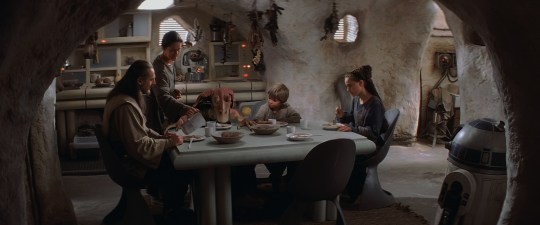
In Episode I, the Skywalkers were shown to lead a life similar to a serf - they lived independently from their slaver, owned personal property and money, were able to negotiate transactions, had considerable freedom in their daily lives. Anakin was shown to feel safe to talk back to Watto, to declare, he won't let himself being defined by his status as a slave, to speak his mind and to confront Sebulba, or to discuss his plan to locate his transmitter and escape, with strangers, and it was shown that a slave is expensive enough that the prospect of having to pay for it, stopped someone as aggressive and hateful as Sebulba from harming Anakin. Although Watto didn't seem to be bothered by promising Anakin to Qui-Gon, which could indicate that it was accepted to split families, it's worth to consider that Watto believed his win to be a fact, thus Anakin will remain his slave, and that he knew that Qui-Gon is from somewhere where the Republic enforces its laws, which explains, why he's not surprised at all when Qui-Gon says, since he won the bet, Watto must release Anakin, rather than transferring ownership.
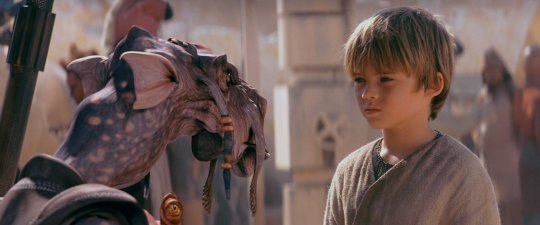
It would be important to note that when he left Tatooine, the cause of Anakin's distress was that he will be on his own and without his mum, missing her, and he become afraid of losing his mother; one must realize that's different from and not the same as being afraid for her life and being worried for her wellbeing. In Episode II, he states, he doesn't understand, why he would have nightmares about her, and when he realizes that he's having premonitions, and returns to Tatooine, his behavior toward Watto is quite friendly, rather than jumping to the conclusion that it must be his former slaver, who harmed Shmi. In fact, George Lucas indicated, Anakin and Watto's reunion in Episode II is analogous to visiting old high school teachers as young adults. What this tells us is that the slaves of those who could very easily afford new ones - such as Zygerrian nobility and Jabba the Hutt - lived a particularly brutal existence, however, most of the enslaved were able to lead a hard, but relatively normal and relatively safe life. Thus, even though Shmi wasn't left in the best circumstances, those circumstances allowed Anakin to leave with the certainty that he will be able to save her.
The Dark Side of "they could've free at least Shmi!"
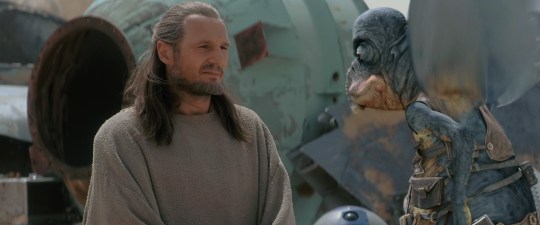
Those people who attach special importance and urgency to Shmi's freedom and insist, Qui-Gon and the Jedi Order was obligated to at least free her, are do so because they like her and they believe she deserves it, or for some, it's Anakin whom they like and therefore they don't want him to be sad without his mum. It's generally unsaid and not even conscious, this type of reasoning postulates that you can and actually, you should arrange people's right to be free into a hierarchy, with those who meet with your standards of goodness who you're close to, or who would make someone you like happy, are enjoying priority over those who you think aren't nice or have no relationship with. Helping those slaves, as this logic goes, is less urgent, they can and they should endure slavery for a bit longer, until the most or more deserving ones are freed. It shouldn't be hard to see, how this way of thinking is actually the flip-side of the way of thinking that condones the institution of slavery, nothing more, nothing less. We have a strong tendency to prioritize the wellbeing of the people who are close to us, who make us feel good, to consider the suffering of people who made us feel bad as well-deserved, to be less concerned, indifferent toward those who we have no relationship at all. But, this tendency is a flaw and it would be important to notice, this is not what Anakin and Shmi would want.
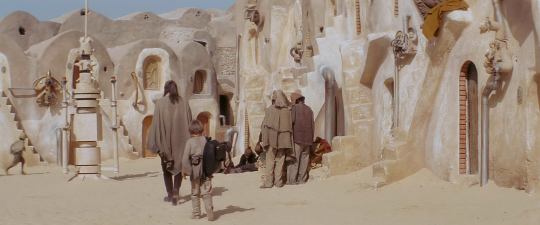
George Lucas’ Star Wars story doesn’t tell us that a non-violent method is the only possible response to injustice and wrongdoing, however, it’s important to point out that this doesn’t mean that it’s ever right to intentionally harm another - but in order to achieve greater benefit for a greater number of people, or when there is no other way to save the defenseless against the aggressor, or it’s an either you or them situation, you can certainly use a violent method. If we examine the situation, killing Watto doesn’t meet with these requirements - it has to do more with the desire to inflict harm upon him or the urge to hit out of those who’re outside of the circle of our personal relationships. Threatening Watto with a lightsaber wouldn’t be as harsh as killing him, but there is no way of preventing him from crying for help - unless killing him - and that would lead to even more killing, not to mention that chances to leave the spaceport would shrink greatly. Therefore, these aren't wholesome responses, and it should be clear why Shmi and Anakin, although he believes, "no one can kill a Jedi," never once suggests that Qui-Gon should go to battle against the slavers, or use violence against them, not even when he realizes that Shmi must stay on Tatooine as Watto's slave, he does not cast stones on him or the Jedi Order for not going to Tatooine to save her. He clearly adheres to these principles in Episode II when he sneaks into the Tusken camp, rather than massacring his way to his mother, but when she dies, out of anger and hate, he wipes them out to avenge her, and in the Clone Wars, he slowly, but steadily becomes more and more willing to kill his opponents, even when he has other options.
A note on Qui-Gon Jinn
Sometimes, Qui-Gon Jinn is accused with being indifferent and ungrateful for not freeing Shmi Skywalker, but, once all unexamined assumptions about the Jedi Order are cleared away, once the dark side of the "they could've save at least Shmi!" is acknowledged, we must realize, Qui-Gon takes Anakin to the Jedi Temple, because he realized, he discovered the promised Chosen One - making him a Jedi Knight, a guardian of peace and justice, giving him the proper training and upbringing to fulfill his destiny, would restore balance to the Force: selfishness under the control of selflessness, people are together as one, cooperating, the Republic functioning enforcing its laws and principles, ending slavery, as it did in the past.

When Shmi asks him, whether he is able to help Anakin to escape slavery, Qui-Gon replies, "I don't know. I didn't actually come here to free slaves." It become popular to assert, this somehow must mean that Qui-Gon is not interested in or he is not intending to free slaves, however, simply no compelling rational basis exists for this assertion. Qui-Gon Jinn is not on Tatooine to free slaves, he was forced to land on the planet ruled by a crime lord, in the middle of a mission to escort a queen who must save millions, to the capital, and he is in desperate need of help. The reason slavery exists in the galaxy is because the Republic no longer functions and fails to enforce its anti-slavery laws. Misinterpreting and misrepresenting these facts is grounded on ingrained mistaken assumptions. In addition, there are those in whom the words, "I didn't actually come here to free slaves" are triggering an emotion that, overthrowing reason, demands them to react with "if he is not on Tatooine to free slaves, he doesn't want to tear down the system!" Which, of course, lacks any sane basis.
The Life and Fate of Shmi Skywalker - the Problem with "Deserving"
It was Shmi Skywalker who taught her son, "the biggest problem in this universe is nobody helps each other." She, just like Anakin, gave without the thought of reward and was full of compassion: despite she was a slave on a world made of dust, Shmi had unwavering commitment to, and raised her son in the spirit of the horizontal love paradigm, was willing to offer refuge to strangers in her home and sharing her meal with them, and was willing to let her son go, so he can become a guardian of peace and justice in the entire galaxy.

Shmi Skywalker, just like her son, had no misconceptions about the Jedi Order and the galaxy: she didn't accuse Qui-Gon or the Jedi in general with failing their duties or being indifferent toward them, and even though she was well aware that the failing Republic abandoned her, she took no pleasure in the misery in the misfortune of Padmé and the others, but was willing to help and letting Anakin to help them. After Anakin left Tatooine to begin his Jedi training, Shmi was freed from salvery by Cliegg Lars, a moisture farmer who later married her. One day, when she was out in the morning gathering mushrooms, she was abducted by Tusken raiders, and she was subjected to brutal torture. Anakin returned to Tatooine to save her, but when they reunited, Shmi succumbed to her wounds and died in his arms. She didn’t ask her son to avenge her, she wasn’t bitter, hateful, angry, fearful. She was happy: “Now I’m complete” and she had nothing to say but, “I love you.” In Clone Wars, Anakin, referring to him wiping out the Tusken village out of revenge, claims "I failed as a Jedi, and I failed you" - implying that Shmi, taught him the same morals and ethics as the Jedi Order.
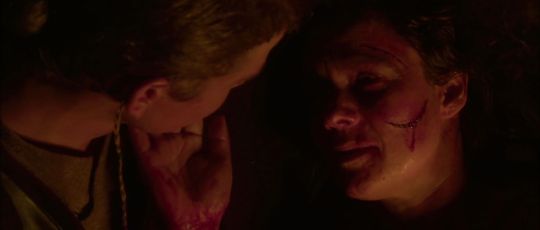
We tend to believe that the world is under the direction of a cosmic moral judge, rewarding good people and punishing bad people - for this, the fate of Shmi Skywalker is often deemed undeserved. From such notions, follows the idea that Qui-Gon Jinn or the Jedi Order was supposed to make sure that justice will be served for her, and what happened to her must be the result of that those, who were supposed to be agents of that cosmic judge, were failed to do their duties. However, the harsh truth is that, the probability of Shmi being abducted by Tusken raiders on Tatooine was the same as the probability of being murdered on any other planet, say, Coruscant. George Lucas' Star Wars presents a cosmos that is devoid of a cosmic system of reward and punishment, and attempts to blame her death on the Jedi Order is quite desperate. The life and death of Shmi Skywalker illustrates the lesson, life will do its own thing, it's not working as a mechanism by which the universe will bring good to good people, bad to bad people. We're interconnected, our lives are interwoven into each other, what happens to us is the product of the actions of others as well as our own, and determined by the degree of balance between selfishness and selflessness without ourselves as well as within others. The greed of Nute Gunray led to the invasion of Naboo and the death of Qui-Gon Jinn, but also led Qui-Gon to Tatooine, where he found Anakin. Shmi let her son go, and her action resulted in the liberation of Naboo, but a decade later, also the formation of the Empire, the destruction of Alderaan, and eventually the death of the Sith and the restoration of balance. Shmi being freed by Lars led to her death in a Tusken camp, Lars marrying Shmi led to his son dying by the hands of imperial storm troopers. All of existence is a vast nexus of causes and conditions, constantly changing, in which everything is interconnected to everything else. Shmi Skywalker illustrates, happiness is not in a reward-punishment system that distributes good and bad among living things based on whether or not they were good or bad. Tapping into her compassion, she was able to accept the reality of the ebb and flow of pleasure and pain of being alive, and was able to find an inexhaustible source of contentment, peace and joy, strength, determination and hope.
Sources:
Star Wars Archives 1999-2005
Star Wars: The Phantom Menace “Prime of the Jedi” featurette
George Lucas’ foreword for Shatterpoint by Matthew Stower
Interviews with George Lucas 1 2 3 4 5
George Lucas' audio commentary for his Saga
Star Wars Saga and Star Wars: The Clone Wars
Please note: I used no Disney or Legends Star Wars materials, (save for the one Shatterpoint foreword) - but I accept that others may found their own reading on them, thus, might come to different conclusions than I do.
#shmi skywalker#anakin and shmi#star wars#very long post#pro jedi order#jedi morals#compassion#attachment#qui gon jinn#slavery#tw slavery
284 notes
·
View notes
Text
Would Anakin have killed the younglings if Palpatine hadn’t told him to? No.
Would he have been in the screwed-up mental state required to obey Palpatine without the other messed up things that had happened to him in his childhood and during the Clone Wars? No.
Should he have killed the younglings, given Palpatine’s years of manipulation and all the other problems people had caused for him? Still no! Murder is never okay!
All this to say that there are MULTIPLE causes for Anakin’s fall (moving past just the youngling example). I mean even in real life, since when has any major historical event had just one cause? There’s always like eighty-seven reasons that bleed into each other. Saying Vader was created by One Specific Thing isn’t what the prequels showed us.
Anakin did have long-standing issues with anger and aggression and extreme attachment, and he is responsible for his actions. At the same time, Anakin was not some devil child who was beyond help and 100% destined for evil from the beginning. The Council’s actions/inactions played a role. Shmi’s unfair death played a role. Palpatine’s manipulations, which started at age nine for Anakin, played a role. Anakin’s personal accountability for his fall doesn’t take away from the external causes, nor do the external causes justify Anakin’s crimes.
Anakin’s story isn’t clear cut black-and-white, never has been. And that’s ok :)
#star wars#anakin skywalker#darth vader#the dark side of the force#palpatine#darth sidious#the prequels#the phantom menace#attack of the clones#revenge of the sith#the clone wars#jedi council#shmi skywalker#anakin and shmi#sith lord#padme amidala
121 notes
·
View notes
Text
So I have a bunch of bookstore gift cards that I want to use, so are there any anidala/Anakin/Padmé centered books/comics that anyone recommends??
#anakin skywalker#star wars#anidala#star wars prequels#padme amidala#darth vader#hayden christensen#anakin and padmé#star wars padme#anakin and shmi#anakin/padme#anakin x padme#star wars anakin#anakin#padmé amidala#padme naberrie#padme skywalker#queen padme#sw padme#star wars books#bookblr#book review#books#book recommendations#book reccs#Star Wars book recommendations
27 notes
·
View notes
Text
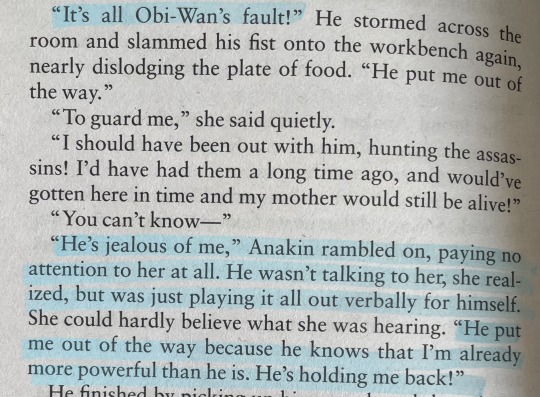

Pain and suffering
#finally read the aotc novel#anakin just spitting shit palpatine's fed him is so very upsetting#haven't been doing my due diligence as an anakin skywalker poster lately. apologies#type: other#fandom: star wars#star wars#sw#star wars prequels#darth vader#anakin skywalker#attack of the clones#anakin and shmi#obi wan and anakin#star wars anakin#obi wan kenobi#padmé amidala#sheev palpatine#aotc
31 notes
·
View notes
Note
I think I want to soak up every take you have on Anakin and Padme with a sponge because yes yes yes. Thoughts on Mustafar?
since this is a more general ask i will take this as an opportunity to chat about something i've been thinking about lately: the direct connection between the aftermath of the tusken raiders massacre and anakin's conviction on mustafar that padme didn't love him anymore.
it's fairly clear from anakin's behavior and language following his massacre of the tuskens that he's aware that what he's done is objectively wrong. he also seems aware of the disconnect from the objective morality of the act, and what he feels about the act. he feels justified in what he did- or, he's trying to convince himself that he is- but he's distressed because he knows that's not what a good person, should be.
(as an aside, a lot of people talk about anakin measuring himself in comparison to morality as determined by the jedi order. but i think in this moment, it's more likely that he's thinking about morality in terms of shmi. he's just killed men, women, and children, supposedly in his mother's name, and on some level he knows that she would never want or condone that.)
anyways, anakin is very unstable and conflicted here. but his response to feeling these emotions- likely influenced by the dangers of expressing such things in his childhood while enslaved- is to lean away from them. he doesn't want to think about, let alone process, the guilt of what he's done. the idea that he's disappointed his mother, that he's tarnished her memory, is too painful for him. he wants someone to give him an excuse not to handle these difficult truths.
this is why he doesn't go to the jedi. it's why he doesn't go to obi-wan. he knows they will tell him what he does not want to hear: that he did a very bad thing. and if they tell him that, then maybe he'll have to confront that his mother would be just as horrified as the jedi were.
and there can sometimes be a fine line between empathy and enabling, which is something padme really struggled with when it came to anakin in particular. (i could make an entire other post about why this is, but we're focusing on how anakin perceived their relationship here, because it'll explain how he perceived her actions within the context of their relationship on mustafar.) and what does padme do?
"to be angry is to be human," she says. providing the justification, the excuse. anakin is able to lean into her comfort, safe in the knowledge that he will not be forced to handle any of the painful truths he had so feared. this comes at the cost of his personal growth; it comes at the cost of his humanity. but in the moment, to him, it feels like salvation. the world was ending and padme made it stop.
i won't go into the clone wars here, because otherwise this post would be too long. but there are many moments within the series where this pattern repeats itself. anakin does something padme isn't comfortable with, or something she initially resists, but her displeasure never lasts and she always returns to him without requiring him to change his mind or understand why she disapproved in the first place. every time this happens, it reinforces and recreates their exchange on tattooine. padme is a safe space for anakin- not just from the world, but from himself. from his own conscience, and from his own guilt.
this brings us to mustafar. anakin has done a terrible thing, an awful thing, in the name of someone he loves. just as he did on tattooine. but while shmi died, and he could only get reprieve from his guilt about the tuskens indirectly (through padme, a surrogate mother figure), in this instance his justification for his crimes is still alive. anakin is hoping for padme to condone his actions, the way he'd hoped shmi would have condoned his treatment of the tuskens.
of course, it was an incredible oversight and misunderstanding of padme as a person on anakin's part to think that she would look past the destruction of her entire life's work. that's just objectively true. but it's also clear to see how anakin's expectations of this unconditional support had only ever been reinforced over the course of their relationship- never challenged.
anakin came to rely on padme for unconditional support, to soothe his guilt and his suspicions that he'd done something terrible. and the moment she finally refused to do that for him, he turned on her.
because in his mind, her love had always been defined by unconditionally supporting him, and if she'd stopped doing that, then to him it meant that she no longer loved him. it's why he was confused- why aren't you doing what you've always done before and helping me ignore my guilt- and it's why he perceived it as a personal betrayal.
#star wars#sw#anakin#anakin skywalker#anidala#padme naberrie#padme amidala#padme#attack of the clones#aotc#revenge of the sith#rots#mustafar#movies#tusken raider massacre#anakin's mommy issues#shmi skywalker#shmi#anakin and padme#anakin and shmi
65 notes
·
View notes
Text
Anakin: Oh, sorry master, I didn't mean to interrupt your date.
Obi-Wan: This is not a date.
Satine: It’s not? Why did I pay then? Am I not getting any or ?
Anakin: *laughs*
Obi-Wan: So how’s your mother Anakin?
Anakin: I don’t know how’s Qui-Gon?
Satine: The two of you really need to learn to calm your dramatic selves the fuck down force-
#obi wan and anakin#anakin skywalker#anakin#anakin needs a hug#obi wan kenobi#obikin#obi wan#anakin x obi wan#obi wan needs a hug#qui gon#qui gon jinn#duchess satine#obi wan x satine#satine kryze#anakin and shmi#shmi skywalker#shmi#star wars#star wars incorrect quotes#star wars prequels
899 notes
·
View notes
Text
The Lunatic of Tatooine

#star wars#star wars fanart#my art#shmi skywalker#anakin skywalker#anakin and shmi#eldritch anakin skywalker
24 notes
·
View notes
Text



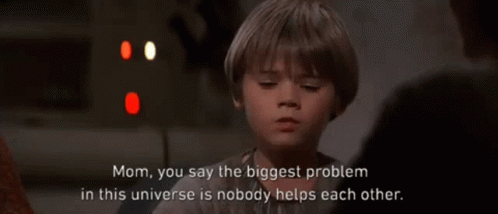

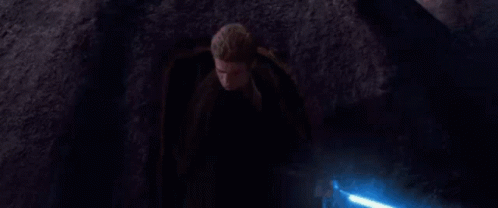
“A mother is god in the eyes of a child”
- Rose, of Sharon; Silent Hill
#anakin skywalker#shmi skywalker#anakin and shmi#star wars#swedit#anakin#anakin star wars#anakin needs therapy#anakin did nothing wrong
130 notes
·
View notes